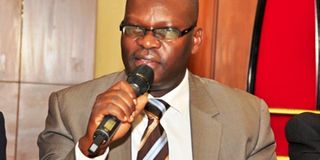Debt burden haunts UCL despite loss reduction

UCL chief executive officer George Inholo
What you need to know:
Problem. The firm has trouble with a debt owed to National Social Security Fund.
Kampala. For the sixth year in a row, Uganda Clays (UCL) shareholders will not be taking home a dividend after the company incurred a third straight loss.
The company, despite a 9 per cent growth in revenue to Shs24b, still made an after-tax loss of Shs1.2b from Shs5.2b in 2014.
The rise in revenue is mostly due to lower cost of sales and expenses but also an additional Shs3b the company got from land sold to the Uganda National Roads Authority (UNRA) for the construction of the Kampala – Entebbe Expressway in Kajjansi.
The clay products manufacturer laid off about 40 employees in 2015 in order to cut costs. Management had projected that the restructuring and operational methods would cut costs by about 40 per cent but that is not reflected in the financial statement.
“There was a registered improvement in the gross margin. This was a result of the concerted effort by management to reduce production costs. The most significant portion saving came from the migration of more affordable firing fuel at the Kamonkoli Factory,” reads a financial statement extract published by UCL.
A much-improved balance sheet has seen assets of the company rising above the liabilities mostly due to increased cash buffers and fixed deposits in commercial banks. UCL, which has been struggling to pay its debts, revealed that all loans to commercial banks had been cleared in 2015.
“The finance costs continue to strain the company’s financial performance. A significant portion of these charges relates to the existing shareholder loan. All commercial debt was however fully paid at the end of the year,” a statement from Uganda Clays reads.
The clay products maker’s troubles are, however, with debt owed to National Social Security Fund (NSSF).
Due to the penalties involved in making late payments, the indebtedness of UCL never seems to change despite the payments made on an annual basis. In 2015, UCL spent Shs4.2b on debt repayments but still their borrowing rose to Shs19.7b, up from Shs19.4b in 2014.
The deal to have NSSF convert its debt into equity is now taking longer than expected as the Fund is hesitant to take over without finding a buyer for the major stake. NSSF insists that the debt to equity conversion is still on track with Stanbic Bank retained as the transactional advisers on the deal.
The conversion, if it happens, would see NSSF increase their shareholding in UCL to about 60 per cent from the current 33 per cent. Other shareholders will have their shares diluted into smaller chunks.
UCL performance
Listed on the Uganda Securities Exchange, the UCL share price has in the last one year lost 17 per cent of its value to Shs15 per share due to low investor confidence. There has been a consistent downward trend of the UCL share price in the last six years.




